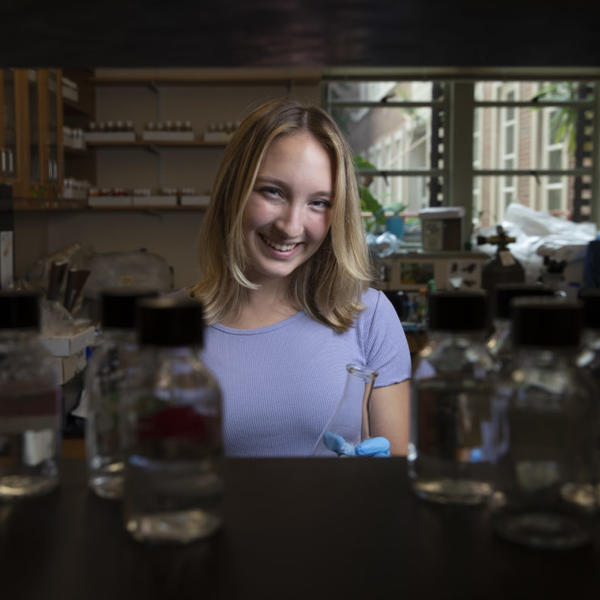As a student participating in the College’s Charles S. Weiss Summer Research Program, Brenna McCormick ‘24 spent eight weeks this summer working with Associate Professor of Biology Geoff Findlay to examine how a novel gene found in only a handful of fruit fly species has evolved to be a major player in fly reproduction. By understanding which genes are most essential for a fly’s reproductive ability, researchers are identifying potential targets of pesticides or genetic engineering to stop the spread of fly species that prey on fruit orchards. Her research builds off of the lab’s prior work, conducted with several Holy Cross students, that was supported with a grant from the National Science Foundation and published in the scientific journal Molecular Biology and Evolution in 2017.
Tell us about your summer research project.
My research this summer focuses on a gene called saturn in the fruit fly, Drosophila melanogaster. Our lab previously found that this gene is required for male fertility, but also that the gene is very young – it exists only in a few fruit fly species. I’m trying to figure out why the gene is important for sperm cell function, and I’m studying how the gene sequence has changed between the species of fly that have it.
Why do you think this area of research is interesting?
I was very intrigued by the genetics portions of my introductory biology classes at Holy Cross, and I felt like this lab would allow me to learn more and get hands-on experience researching in this area. I also liked the idea of getting experience working with fruit flies. I’ve already seen them used in a variety of papers I’ve read in my biology classes, so doing research with them allows me to expand my skills and better understand what I’m learning in class.
Without a properly functioning reproduction system, organisms are not able to survive and reproduce. Because of this, you might expect the genes involved in reproduction not to change very much from one species to the next. I thought it was surprising that a new gene could take on such an important role. It was also cool to work on a gene that no one outside of our lab has studied.
What should a person without a background in science know about this research?
McCormick: Our work in fruit flies has shown that newly evolved genes often come to function in reproduction in many species, including humans. Thus, learning how new genes become involved in reproduction in flies may offer clues into how they do so in other species.
Findlay: Some of the genes we're studying are found in other species of fruit flies that are agricultural pests. By figuring out which genes are most essential for a fly’s reproductive ability, researchers are learning which genes could be targeted by pesticides to stop the spread of these problematic fly species.
Do you intend to continue with this research after the summer? If so, how?
Yes, I intend to continue to work in this research lab going into the school year. My time here this summer has set me up to be able to work more independently during my free time through the academic year as I have been introduced to many different procedures and techniques that I will need in the future to continue this work.
Related News:
Digging into DNA: Biology Professor Wins $780K NSF Award for Genetics Research
New Genes Make a Big Impact on Fruit Fly Fertility

Brenna McCormick '24 spent her summer in the lab researching newly evolved genes in Drosophila.
Read Time
3 Minutes

